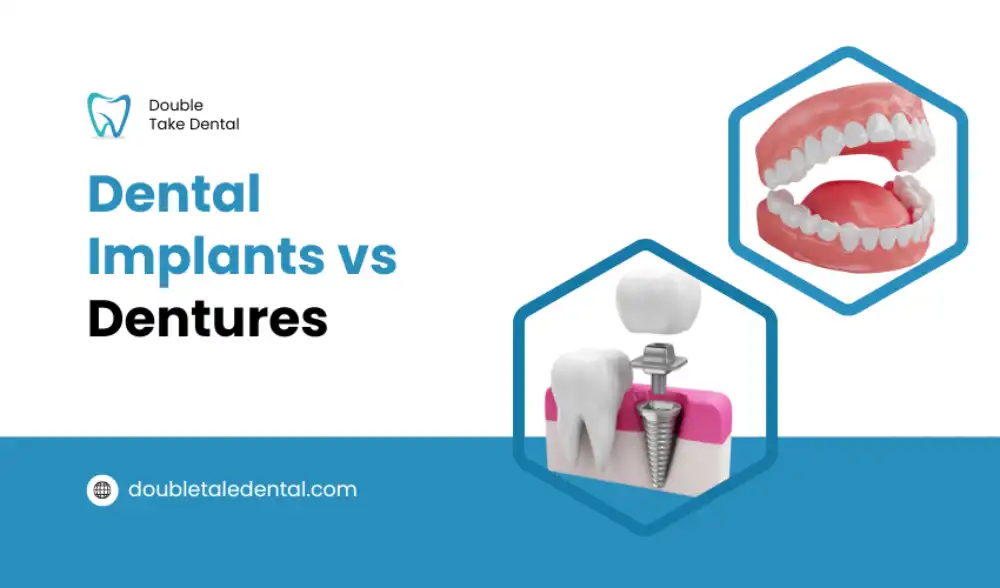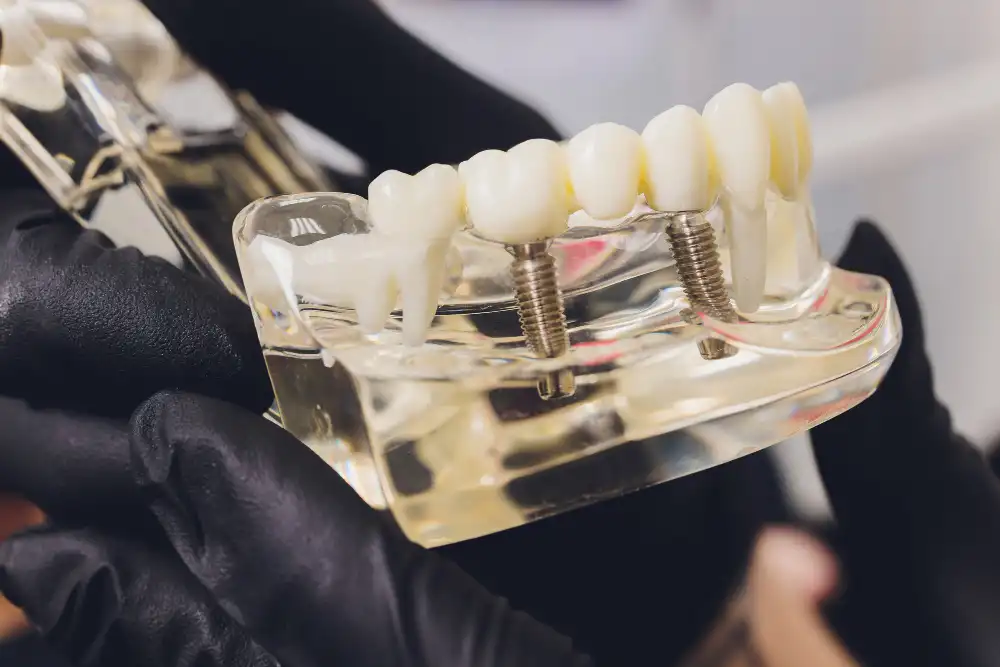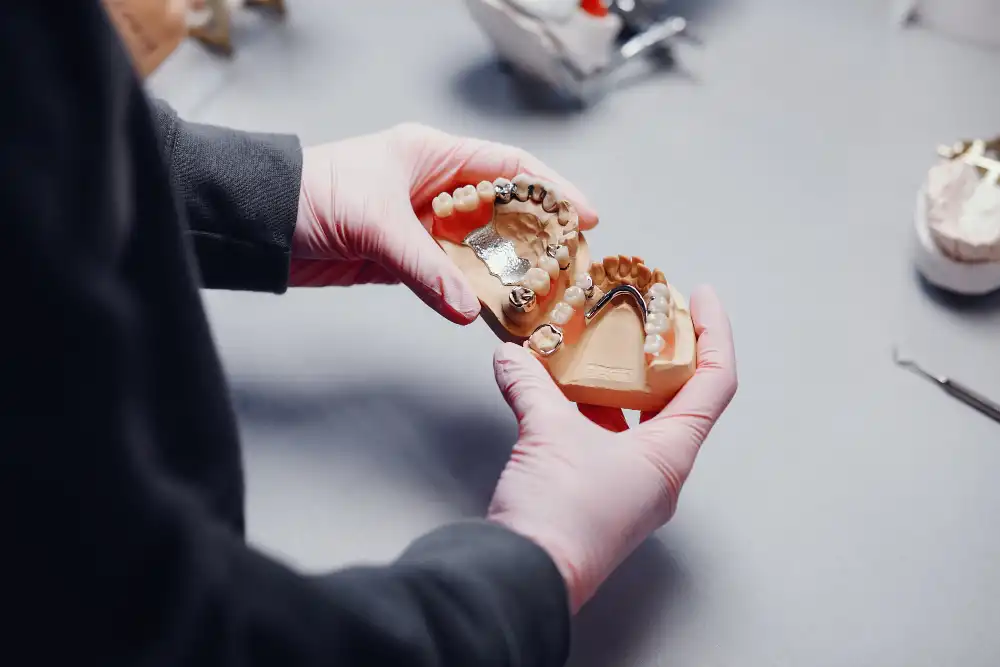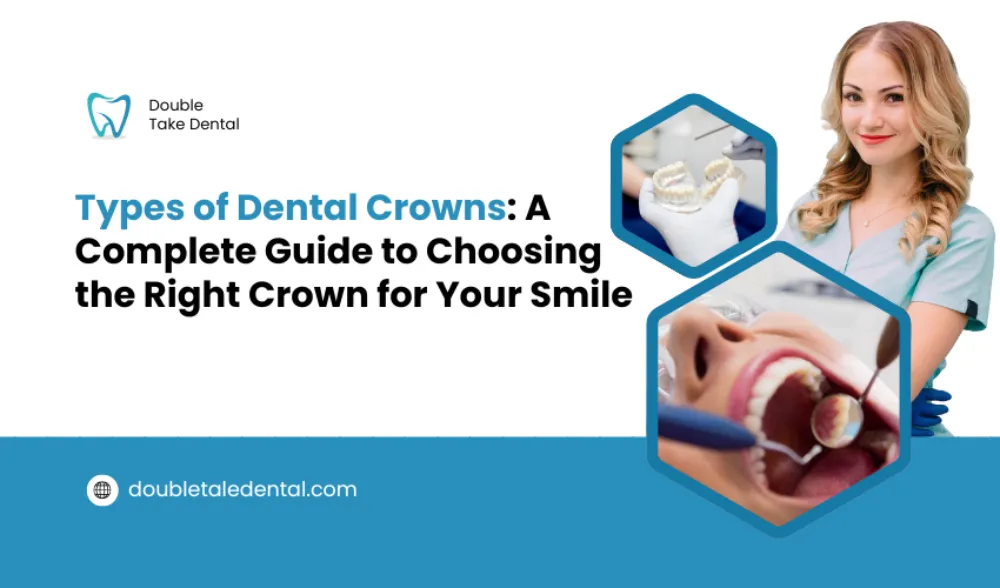Dental Implants vs. Dentures: In-Depth Comparison Guide

Did you know that more than 36 million Americans have lost all their teeth? Even more startling, about 120 million individuals in the U.S. are missing at least one tooth. Given these numbers, finding the right tooth replacement option becomes essential, not just for appearance but also for your overall oral health.
Implants and dentures are two popular solutions for tooth replacement. Both options help restore your smile and improve oral function, yet they differ significantly. Factors such as procedure complexity, cost, durability, ease of maintenance, and comfort levels set these treatments apart.
To determine the best choice for your specific needs, you must understand how each option aligns with your lifestyle, budget, and dental health goals. In this comprehensive guide, we will examine the key differences between dentures and dental implants.
Before deciding which option suits you best, let’s first understand the basics. Here are dentures vs. dental implants and how each option works.
What Are Dental Implants and Dentures?

Dental Implants
Dental implants are artificial tooth roots made of titanium or zirconia. A dentist surgically places these implants directly into your jawbone. After placement, they naturally fuse with your bone in a process called osseointegration.
A dental implant looks and works just like your natural tooth. It also stimulates the normal health of jawbones by preventing bone loss. With proper care, these artificial teeth can last a lifetime.
Dentures
Dentures are removable structures designed to replace missing teeth. Instead of being surgically attached, they rest directly on your gums. Usually, clasps, adhesives, or natural suction help keep them secure and comfortable.
Dentures typically come in two forms: complete and partial. Complete dentures replace an entire upper or lower set of teeth. On the other hand, partial dentures fill in gaps where some natural teeth remain intact.
Key Differences Between Dental Implant vs Dentures

Understanding the core differences between dentures and dental implants will help you pick the best option. Each has unique features tailored to different lifestyles and needs.
- Procedure
The procedures for dentures and implants differ significantly. Knowing how each treatment works will ensure that you make a well-informed choice. For example:
- Dental Implants
Getting dental implants involves multiple steps and takes several months. Initially, your dentist performs X-rays and scans to check your jawbone’s strength and density. After this assessment, they surgically insert a titanium post into your jaw.
Healing follows, usually lasting about 3 to 6 months. During this period, the implant bonds firmly to the bone, a process called osseointegration. Once integrated, your dentist attaches an abutment (connector piece). Lastly, a customized crown caps the implant, creating a sturdy and natural tooth.
- Dentures
Dentures offer a quicker, non-surgical alternative. Your dentist first takes detailed measurements and impressions of your mouth. During this preparation, you will wear temporary dentures to maintain daily comfort.
When your custom dentures are ready, your dentist makes final adjustments. This ensures they fit securely, feel comfortable, and function effectively.
- Cost Breakdown
Dental implants typically range from $1,600 to $2,200 per tooth. If you are considering full-mouth implants, costs may rise between $20,000 and $45,000. Prices depend heavily on the number of implants and the complexity of the procedure.
Dentures, meanwhile, are more affordable upfront. A complete set generally costs from $1,600 to $2,000. However, because dentures usually need replacement every 5 to 7 years, long-term expenses can accumulate.
- Comfort and Fit
Dental implants fuse directly with your jawbone, offering unmatched stability. This bond creates a natural-feeling bite without slipping or discomfort. Traditional dentures may shift or loosen, relying on adhesives to remain secure.
A popular compromise is implant-supported dentures. These combine implant stability with the convenience and lower cost of removable dentures.
- Durability and Longevity
Dental implants stand out for their exceptional longevity. With proper care, implants typically last at least 20 years and often a lifetime. The implant’s integration into the jawbone also preserves bone density, maintaining overall oral health.
Traditional dentures have a much shorter lifespan—usually around 5 to 7 years. Additionally, dentures can lead to gradual bone loss, which affects the jaw structure over time.
- Maintenance and Care
Dental implants require minimal special care. You treat them just like natural teeth, brushing and flossing daily. Maintaining a consistent oral hygiene routine is straightforward and hassle-free.
Dentures, however, need more careful attention. You must remove them nightly for cleaning and soaking. Occasionally, you will need adhesives to hold them firmly in place during the day.
Who Is the Right Candidate? Dental Implants vs. Dentures

Choosing between dental dentures versus implants depends on various personal factors. Here’s a clear and concise overview to guide you toward the right decision.
Age Factor
Younger people often choose implants for their long-term benefits, as they can last 20+ years. According to a study by AAID, more than 3 million people in the U.S. have dental implants, with an additional 500,000 individuals getting them each year. Seniors may prefer dentures since they are non-invasive and do not require surgery.
For seniors, dentures are often more appealing. They offer a simpler solution since they do not require surgery. Additionally, dentures are easy to remove, clean, and maintain. With advancements in modern materials, they can look almost as natural as real teeth.
Bone Health
The health of your jawbone significantly impacts your tooth replacement choice. Dental implants require sufficient bone density to anchor effectively.
If you have experienced bone loss due to age or medical conditions, bone grafting might be necessary before implant placement. Studies indicate that over 50% of individuals require bone grafting prior to receiving implants.
On the other hand, dentures offer a simpler alternative for individuals facing significant bone loss. They don’t rely on strong bone structure for stability. Therefore, they are a good option for people with weakened jawbones.
Lifestyle Considerations
Lifestyle plays a crucial role in choosing between teeth implants vs dentures. Dental implants function just like natural teeth. They remain firmly in place and allow you to speak clearly and eat comfortably without extra maintenance.
In contrast, dentures might occasionally slip or loosen and affect confidence while speaking and eating. Additionally, dentures typically need periodic adjustments to maintain a proper fit.
Budget Limits
Dentures are cheaper, but they need replacement every 5-10 years. On the other hand, dental implants are a one-time investment. Due to their higher maintenance needs, implants often prove to be more economical than dentures in the long run.
Final Thoughts
In conclusion, dental implants and dentures each come with unique advantages. Your individual needs, budget, and lifestyle play key roles in determining the best choice.
Dental implants offer durability and closely mimic natural teeth. They function naturally and require minimal upkeep. On the other hand, dentures are a more affordable, less invasive alternative. However, they often need extra maintenance and regular replacements.
Ultimately, your ideal solution depends on factors such as age, bone health, and personal preferences.
Double Take Dental – Your Best Dental Restoration Solution
At Double Take Dental, our experts specialize in dental restoration treatments. We offer advanced dental implants, dentures, and implant-supported dentures. Using innovative techniques and modern technology, our skilled team restores the function and beauty of your smile. As a result, you experience maximum comfort throughout your treatment journey.
We understand that deciding between dental implants versus dentures can feel overwhelming. To simplify this process, we provide detailed consultations.
Our professionals carefully consider your oral health, individual preferences, and budget to guide you toward the best possible choice.
Recent Posts

What Foods To Avoid After a Tooth Extraction & What to Eat

Types of Dental Crowns: A Complete Guide to Choosing the Right Crown for Your Smile

What to Eat After Root Canal: Recovery Tips & What to Avoid

